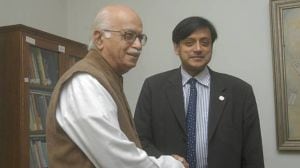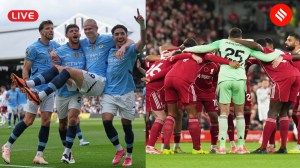Giving Godse his due?
There is only one similarity between Gandhi and me he got killed by me and I got killed for killing him; and the only difference is that he...

There is only one similarity between Gandhi and me he got killed by me and I got killed for killing him; and the only difference is that he lived for his ideals and I died for mine," says Nathuram Godse in his opening soliloquy in Gandhi Ke Godse, a Gujarati play about the man who assassinated Mahatma Gandhi.
In the 50th year of India’s independence, the writer-director duo of Jaysukh Ravrani and Vipul Bhargav have put together this two-act play in an attempt to give an accurate sketch of Godse and his motives behind the killing of the Mahatma.
"We opened our play on August 15, because we wanted to make a statement on that historic day, that there are several chapters in our political history which have been carefully suppressed by people in power. And Godse is one such figure whom the masses and politicians have consistently tried to negate," says Bhargav.
The play tries to delve deeper into Godse’s psyche to understand his compulsions for committing the act that made him a national villain. The hero of this play is not the Hindu fundamentalist maniac that Godse has been made out to be over the years. He is a well-educated man and is the editor of a Pune-based newspaper, Agrani.
"As a child he was a Gandhian. But in the post-Partition days he thought that Gandhi was holding the entire nation to ransom and favouring Pakistan. He gave away Rs 55 crore when our country’s coffers were empty, and he even asked Hindus who were fleeing Pakistan for India, to go back. My hero felt that if Gandhi lived, he would do more harm than good," says Ravrani.
The play describes various incidents which prompted Godse’s act — the Mahatma’s habit of holding the council of ministers to ransom by threatening to fast unto death; the condition of Hindu refugees from Pakistan; Gandhi’s own statements that he would go and live in Pakistan; Jinnah’s demand for a corridor between Karachi and Dhaka to build a railway line, and the fear that once again Gandhi would pressurise the ministers to given in to Jinnah’s wish.
Says Ravrani, "Godse believed that his action would be in the best interest of our nation. If he hadn’t done so, princely states like Hyderabad and Junagadh would have also gone back on their word and refused to join the Indian republic."
There is also a detailed re-construction of the original plot to assassinate Gandhi on January 20, 1948, executed by a team of four people — Nathuram and his brother Gopal, along with Nana Apte and Madanlal Pahwa, a Hindu migrant from Pakistan who lost members of his family on the way to India.
That attempt, however failed, and after the Delhi police arrested Pahwa, Godse decided to finish the job himself. "Godse knew the consequences of his act. He was very aware of that once he killed Mahatma Gandhi, death was inevitable. But he felt so strongly about what he had to do, that he thought his life was a small price to pay.
That’s his greatness," says Ravrani. The playwrights claim that everything they have shown in Gandhi Ke Godse is backed by factual evidence. But they were quite wary of political pressure to stop the play from being staged and didn’t start their readings before getting the play cleared by the censors.
Apart from the ridicule he and his partner had to face in the initial stages, they also ran into problems getting an actor to play their infamous hero. "One actor rehearsed for three days and walked off saying he wasn’t convinced about the part. We even approached one of the bigwigs of Gujarati theatre but he didn’t take us seriously," he says.
Finally they found television and theatre actor Rajendra Chawla who took up the challenge. Initially, he too was sceptical. "I realised that people had only seen the darker side of Godse. When I read the play I was convinced that I wanted to play this man," says Chawla.
And to understand his character better, he visited Nathuram’s brother Gopal in Pune. Gopal sketched the real Nathuram for the actor. "I figured that the man was clear headed, he never fumbled with his decisions. And more than anything else I felt that it was my duty to try and justify the character I had chosen to play," he says.
While the Gandhi Ke Godse team sincerely believe that they are trying to rectify historical mistakes, the audience seems sceptical. "It is a good play, but I am not convinced about its historical authenticity," says a lady who watched the play, at Tejpal auditorium last Saturday.
Then there are others who seem to have had a change of heart about Gandhi and Godse after hearing Godse’s side of the story. "There was this 75-year-old woman who came up to me after a show and said, I didn’t know about all these things at all’," says Chawla.
The playwrights strongly deny any attempt at raking up the past or propaganda to sell the play. "I don’t indulge in politics. But I want people to watch my play and judge the man themselves," says Ravrani.
At Y B Chavan Auditorium, Sachivalaya. On September 28, 1997. Time: 4.00 pm.



- 01
- 02
- 03
- 04
- 05




























